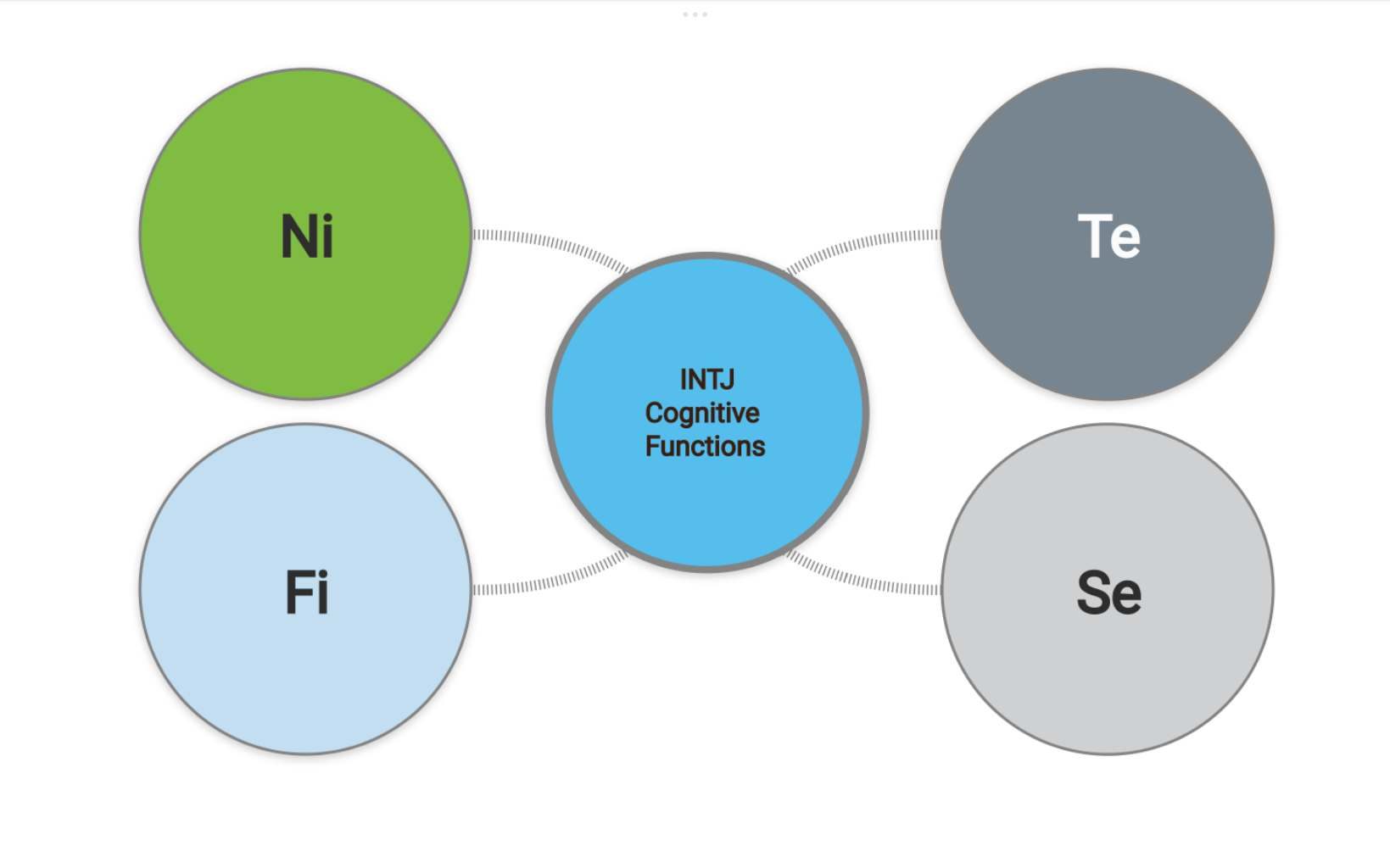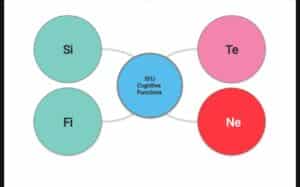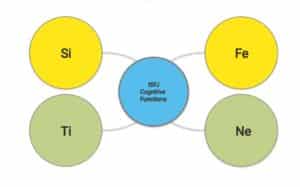Reading Time: 15 Minutes
Alright, let’s kick things off by talking about INTJ cognitive functions. If you’ve ever wondered what makes INTJs tick – why they plan like military generals and think about the future like it’s their personal crystal ball – then you’re in the right place. INTJ cognitive functions are the mental gears that drive their thinking and behavior. They shape how INTJs see the world and interact with it. Think of these functions as their personal toolkit for making sense of life and plotting their next big move. In this blog, we’ll break down these functions, clear up some common myths, and give you tips to make the most of them. Ready to dive in? Let’s go!

The Concept of Cognitive Functions
Alright, folks, let’s break this down as simply as possible. You know how each of us has a unique way of thinking and behaving? Well, that’s where cognitive functions come into play. They’re like the backstage crew running the show of our personality. Think of cognitive functions as the mental tools we use to understand and interact with the world.
In the world of the Myers-Briggs Type Indicator (MBTI), each personality type has a specific set of these tools, and for our INTJ friends, there are four main ones. These functions explain why INTJs are the way they are – super planners, big thinkers, and sometimes a bit socially awkward (but in a charming way, of course).
The Four Main Cognitive Functions of INTJs
1. Dominant Function: Introverted Intuition (Ni)
Okay, picture this: you’re in a dark room, and suddenly, a spotlight shines on a hidden treasure chest. That’s how Introverted Intuition works for INTJs. It’s their superpower for seeing the big picture and connecting the dots that no one else can see. INTJs have a knack for looking at complex situations and predicting how things will unfold. They don’t just see what is; they see what could be. So, when your INTJ buddy starts talking about future possibilities or grand plans, they’re not just daydreaming – they’re using their Ni to map out a brilliant path forward.
2. Auxiliary Function: Extraverted Thinking (Te)
Now, let’s add some organization to the mix. Extraverted Thinking is all about structure, logic, and efficiency. Imagine having a super-organized friend who loves making lists and schedules, and always seems to have a plan. That’s Te for you. For INTJs, this function helps them turn their big ideas into reality. They use it to organize their thoughts, make decisions based on facts, and achieve their goals efficiently. So, if you ever need a solid plan or some logical advice, your INTJ friend is the one to call.
3. Tertiary Function: Introverted Feeling (Fi)
This one’s a bit more personal and under the radar. Introverted Feeling is about personal values and deep emotions. It’s like having an internal compass that guides you based on what truly matters to you. For INTJs, Fi helps them stay true to themselves and their principles, even if they don’t always show it on the surface. This function is why INTJs might seem distant or reserved at times – they’re busy checking in with their inner values and making sure their actions align with their core beliefs. It’s their way of staying authentic, even if it means making tough decisions.
4. Inferior Function: Extraverted Sensing (Se)
Last but not least, we have Extraverted Sensing, the wild card in the INTJ’s deck. Se is all about being in the moment, experiencing life through the five senses, and taking spontaneous actions. For INTJs, this is the function that often feels a bit awkward and challenging. While they’re great at planning and foreseeing the future, being present and going with the flow can be tricky. When INTJs tap into Se, they might try new activities, enjoy sensory experiences, or even act impulsively. It’s their way of balancing out all that deep thinking with some real-world fun, even if it doesn’t come naturally.
So there you have it – the four cognitive functions of INTJs in a nutshell. These mental tools make INTJs the strategic, insightful, and occasionally quirky individuals we know and love. Next time you see your INTJ friend zoning out or meticulously planning their next move, you’ll know exactly which cognitive function is at work behind the scenes.
You Might Like To Read: ISTJ Cognitive Functions (SiTe/FiNe): All 4 Functions Explained in Very Simple Manner
The Shadow Functions of INTJ
Alright, friends, let’s dive into the mysterious world of shadow functions. Think of these as the less visible, more challenging aspects of an INTJ’s personality. They’re like the dark side of the moon – rarely seen, but always there. Shadow functions pop up when INTJs are stressed or out of their comfort zone. They’re not as natural for INTJs, which can make them a bit tricky to handle. Here are the shadow functions for INTJs:
1. Extraverted Intuition (Ne): This is the opposite of their dominant Introverted Intuition (Ni). While Ni focuses on one big idea, Ne is like a pinball machine of possibilities. It can make INTJs feel scattered and overwhelmed by too many options, which they don’t particularly enjoy.
2. Introverted Thinking (Ti): This one is all about internal logical analysis. INTJs prefer using Extraverted Thinking (Te) for structure and efficiency. When Ti kicks in, they might get stuck overthinking details or questioning their decisions, which can be frustrating.
3. Extraverted Feeling (Fe): This function is about connecting with others’ emotions and social harmony. INTJs usually operate with Introverted Feeling (Fi), which is more about personal values. Fe can make them feel awkward in social situations, trying to please everyone and losing their sense of self.
4. Introverted Sensing (Si): Si is the opposite of their inferior Extraverted Sensing (Se). It deals with past experiences and traditions. INTJs like to look forward, not back, so when Si takes over, they might dwell on past mistakes or become overly nostalgic, which isn’t their style.
How INTJs Use Their Cognitive Functions in Various Aspects of Life
Career and Professional Settings
In the workplace, INTJs are the masterminds. They use their Introverted Intuition (Ni) to see the big picture and plan for the future. Their vision and strategic thinking help them come up with innovative solutions and long-term goals. Then, they switch on their Extraverted Thinking (Te) to organize their ideas, create efficient systems, and lead projects. This combo makes them excellent leaders, planners, and problem-solvers.
When it comes to personal values, Introverted Feeling (Fi) helps INTJs stay true to their principles. They might not wear their hearts on their sleeves, but they deeply care about doing the right thing. In stressful situations, their Extraverted Sensing (Se) might kick in, leading them to seek out new experiences or impulsively change direction, which can actually help them stay balanced and adaptable.
Relationships and Social Interactions
INTJs aren’t the life of the party, but they do value close relationships. Their Ni helps them understand others on a deep level, while Te ensures they communicate their thoughts clearly and logically. They might come off as reserved or even a bit aloof, but that’s just because they’re using Fi to navigate their emotions and connect with people who share their values.
In social settings, Se helps them stay present and engage with the world around them. Although it’s not their strongest suit, practicing Se can make INTJs more spontaneous and open to new experiences, which is always a good thing.
Personal Growth and Self-Improvement
For personal growth, INTJs rely heavily on their Ni and Te. They set ambitious goals and create detailed plans to achieve them. They constantly seek knowledge and improvement, always aiming to become the best version of themselves. Fi plays a crucial role in ensuring their growth aligns with their core values and beliefs.
Se might push them to step out of their comfort zone and try new things. Whether it’s picking up a new hobby or traveling to a new place, engaging with the world through Se helps INTJs grow in unexpected ways.
Tips for Developing INTJ Cognitive Functions
Alright, INTJ friends, let’s get practical. We know you’re all about planning and improving, so here are some straightforward tips to help you enhance those cognitive functions of yours. Think of these as your personal cheat codes for leveling up.
1. Sharpen Your Introverted Intuition (Ni):
Practice Visioning: Set aside time to imagine future scenarios and goals. The more you use your Ni, the better you’ll get at seeing patterns and possibilities.
Reflect Regularly: Keep a journal where you jot down your insights and ideas. This helps you track your progress and refine your vision over time.
2. Boost Your Extraverted Thinking (Te):
Organize Everything: Use tools like planners, to-do lists, and project management apps. Structure helps you channel your Te into effective actions.
Seek Feedback: Don’t be shy to ask for others’ opinions on your plans. It helps you refine your strategies and makes your Te even sharper.
3. Develop Your Introverted Feeling (Fi):
Explore Your Values: Spend time thinking about what truly matters to you. Understanding your values helps you stay authentic and make decisions that align with your core beliefs.
Practice Empathy: Try to understand others’ perspectives, even if they’re different from yours. It helps you connect better with people and balance your Fi with compassion.
4. Enhance Your Extraverted Sensing (Se):
Engage in New Experiences: Step out of your comfort zone and try new activities. Whether it’s a spontaneous trip or a new hobby, engaging with the world helps you develop your Se.
Be Present: Practice mindfulness and focus on the here and now. It helps you enjoy life’s immediate experiences and reduces the stress of overthinking.
Common Misconceptions About INTJ Cognitive Functions
Now, let’s clear up some myths about INTJ cognitive functions. People often get things twisted, so here’s the truth in simple terms.
1. INTJs Are Just Cold and Detached:
Myth: People think INTJs are emotionless robots.
Reality: While INTJs might not always wear their hearts on their sleeves, they have deep feelings and care a lot about their values. Their Introverted Feeling (Fi) means they’re more in tune with their own emotions than they might let on.
2. INTJs Only Focus on the Future:
Myth: Folks believe INTJs are so obsessed with planning that they ignore the present.
Reality: Sure, INTJs love to think about the future thanks to their Introverted Intuition (Ni), but they do care about the present too. Their Extraverted Thinking (Te) helps them manage day-to-day tasks efficiently, even if they don’t always show it.
3. INTJs Are Bad at Socializing:
Myth: People assume INTJs are antisocial and awkward.
Reality: INTJs might prefer deep conversations over small talk, but they can still be great at social interactions. Their Extraverted Sensing (Se) can help them engage more with the world around them when they make an effort.
4. INTJs Don’t Need Feedback:
Myth: Some think INTJs are too confident to take advice from others.
Reality: INTJs value feedback to improve their plans and strategies. Their Extraverted Thinking (Te) thrives on constructive input to refine their ideas and achieve their goals.
There you have it! Whether you’re honing your cognitive functions or debunking myths about them, remember that understanding and growth are always possible. With these tips and a bit of myth-busting, you can better navigate your INTJ strengths and quirks.
Conclusion On INTJ Cognitive Functions
So, there you have it – a down-to-earth guide to INTJ cognitive functions. We’ve explored the main functions that make INTJs the strategic masterminds they are, looked at their shadowy sidekicks, and tackled some common misconceptions. Understanding these cognitive functions isn’t just for INTJs; it’s for anyone who wants to get a better grip on how they or their INTJ friends think and operate. Remember, knowing how these functions work can help you navigate life a little smoother and appreciate the unique ways people process information and make decisions. So, whether you’re an INTJ looking to fine-tune your mental toolkit or just curious about what makes your INTJ buddy tick, you’ve got the basics now. Keep exploring and stay curious!
If you like the post, then please don’t forget to share with your friends.
Some Of The Previous Posts



